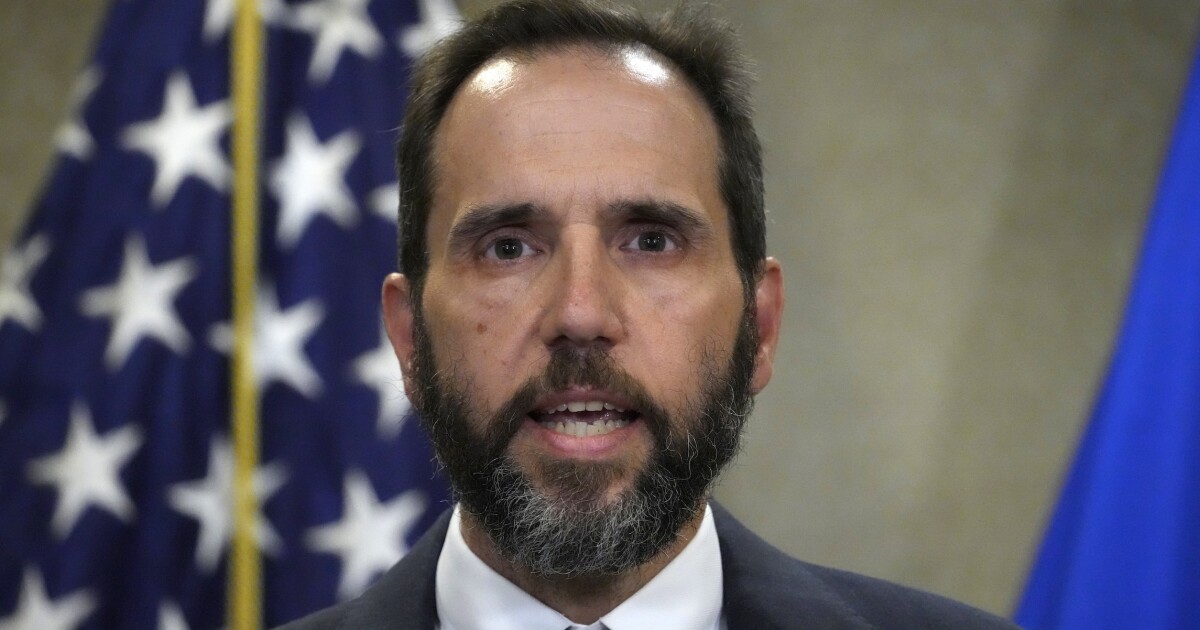

Newly released audio in Donald Trump’s classified documents case could complicate the former president’s ability to claim he did not brandish sensitive material to people at his private club.
The recording, provided to several news outlets on Monday, added more context to a conversation that special counsel Jack Smith had quoted in his indictment of Trump in early June. It captured the former president referencing a specific paper containing information about a plan of attack on Iran.
BIDEN TRIES TO SHAKE LOW MARKS ON ECONOMY WITH ‘BIDENOMICS’ PUSH
While in their charging document, prosecutors had already quoted Trump acknowledging he failed to declassify material in his home. The recording revealed the former president in context, describing the nature of the material to guests at Mar-a-Lago.
That directly contradicted what Trump said publicly about the exchange last week when he told Fox News’s Bret Baier that he had not been referencing any specific document at the time but rather a pile of newspaper clippings and magazine pages.
In the leaked audio recording, however, Trump appears to describe a specific document prepared for him by Chairman of the Joint Chiefs of Staff Mark Milley.
The recording shows Trump and unnamed individuals discussing reports from his presidency that he wanted to attack Iran. Trump appeared to deny the reports. Instead, he apparently suggests in the recording that it was Milley and the Pentagon who pushed for an attack on Iran, and the sound of rustling papers can be heard in the background of the recording as Trump hunts for a paper to prove his point.
“They presented me this,” he says on the recording. “This was him. This wasn’t done by me, this was him. All sorts of stuff — pages long, look.”
Trump went on to say that while in office, “I could have declassified” the paper but noted that he no longer had the authority to do so.
It was a starkly different tone than Trump’s in the Fox News interview.
“There was no document,” Trump told Fox News in an interview that aired on June 19. “That was a massive amount of papers and everything else, talking about Iran and other things. And it may have been held up, and it may not, but that was not a document. I didn’t have any document per se.”
Jonathan Turley, a constitutional law professor at George Washington University, said Trump’s interview with Fox News could be admissible in court during the trial.
“[It will] be difficult for Trump to maintain his argument that he declassified all of the material that was brought to Mar-a-Lago in light of the audiotape. Jurors do not take kindly to such contradictions,” Turley told the Washington Examiner.
Trump’s defense team initially argued that the former president held on to sensitive documents from his time in office because he had declassified them while he still had the power to do so.
His lawyers used that defense to push back against scrutiny of the number of papers with classified markings that the FBI seized from a search of Trump’s home in August,
After prosecutors released the indictment, however, Trump and his team have made the claim declassification claim less and less.
Instead, they’ve focused more on what they say is unethical behavior from the Justice Department.
“The tape also makes it very unlikely that he will ever take the stand,” Turley said. “While that is fairly rare in major cases, it will be even less likely if he could be confronted or impeached with the use of audiotape.”
Trump said Tuesday that his reference to the document was “bravado.”
The full context of what Iran-related document Trump might have held up will be key to determining the former president’s legal exposure.
Much about the military’s planning for a potential attack on Iran is already part of the public record.
In 2019, for example, the New York Times reported that “the Pentagon’s preferred plan was to attack one of the missile-laden Iranian boats that the United States had been tracking in the Gulf of Oman.”
At the time, the Trump administration was weighing options for retaliation against Iran after the Iranians shot down an American surveillance drone.
Trump tweeted publicly in January 2020 that the U.S. military had identified 52 specific targets to strike if Iran retaliated for the American killing of one of its top military leaders.
But the charges Trump faces could still hold up in court even if the document he referenced in the recording was not classified.
“The Espionage Act refers to ‘national defense information,’ not classified information, so even if there were evidence that he had declassified anything, which there’s not, it wouldn’t help him because a declassified document can still be national defense information,” Andrew McCarthy, a former U.S. attorney, told the Washington Examiner.
The tape recording could pierce Trump’s defense instead because of how it supports prosecutors’ version of events.
“First, it will help prosecutors prove knowledge and intent, which must be established to show that Trump’s retention of the documents and refusal to surrender them was willful (an essential element of the Espionage Act counts), and that he was intentionally obstructing the investigation (an essential element of the obstruction charges),” McCarthy said. “Second, it will help prosecutors prove consciousness of guilt, which is also key in establishing intent.”
Trump may have inadvertently added to the body of evidence surrounding the obstruction charge during his Fox News interview when he said he did not turn over documents responsive to a subpoena because he wanted to take his time going through boxes of papers that also contained his personal effects.
“I never thought Trump’s unsupported claims that he had declassified the documents made any sense because declassification is not a defense to either obstruction or document retention,” McCarthy said.
Why Trump held on to records for months despite pressure from the National Archives and Records Administration and, later in the process, the Justice Department to hand them over is likely to be a key focus of the trial.
Judge Aileen Cannon, who is overseeing the case, set Trump’s trial date for Aug. 14, although the Trump legal team could move to have the trial delayed.
Critics have protested Cannon’s role in the case given that Trump appointed her to her spot on the U.S. District Court for the Southern District of Florida in 2020.
Cannon previously encountered the classified document case in August when the Justice Department and Trump’s team fought over how the government could use documents that the FBI seized in a raid of Mar-a-Lago that month. Cannon faced criticism for granting the Trump team’s request to have a special master, or outside attorney, review the seized documents to assess whether any would fall under claims of attorney-client or executive privilege.
A higher court ultimately overruled Cannon.
This week, Cannon pushed back on the special counsel’s office when she rejected its request to seal a list of 84 witnesses Trump is barred from contacting except through lawyers.
Cannon ruled that prosecutors had not demonstrated why the list needed to be kept secret and why redactions or a partial seal would not be enough to accomplish the Justice Department’s goals.
The judge also set a date, July 14, for beginning the complicated process of how the court will handle the classified documents at the heart of the case.
The pretrial wrangling over which documents can be admitted as evidence, and which are too sensitive for jurors to see, can be a lengthy process, McCarthy suggested.
CLICK HERE TO READ MORE FROM THE WASHINGTON EXAMINER
“That’s why I don’t believe there’s any chance this case will go to trial anytime soon,” he said. “By the time the case goes to trial, all of the evidence the judge rules admissible will have to be declassified (if the government claims it’s too sensitive to be declassified, the judge can dismiss any portion of the indictment, or all of it, on which the defendant would be denied a fair trial by lack of access to the classified information).”
“So the jury is never exposed to classified information; if the government thinks it’s important enough to get Trump convicted, it will have to declassify the information necessary to satisfy his due process rights,” McCarthy added.





